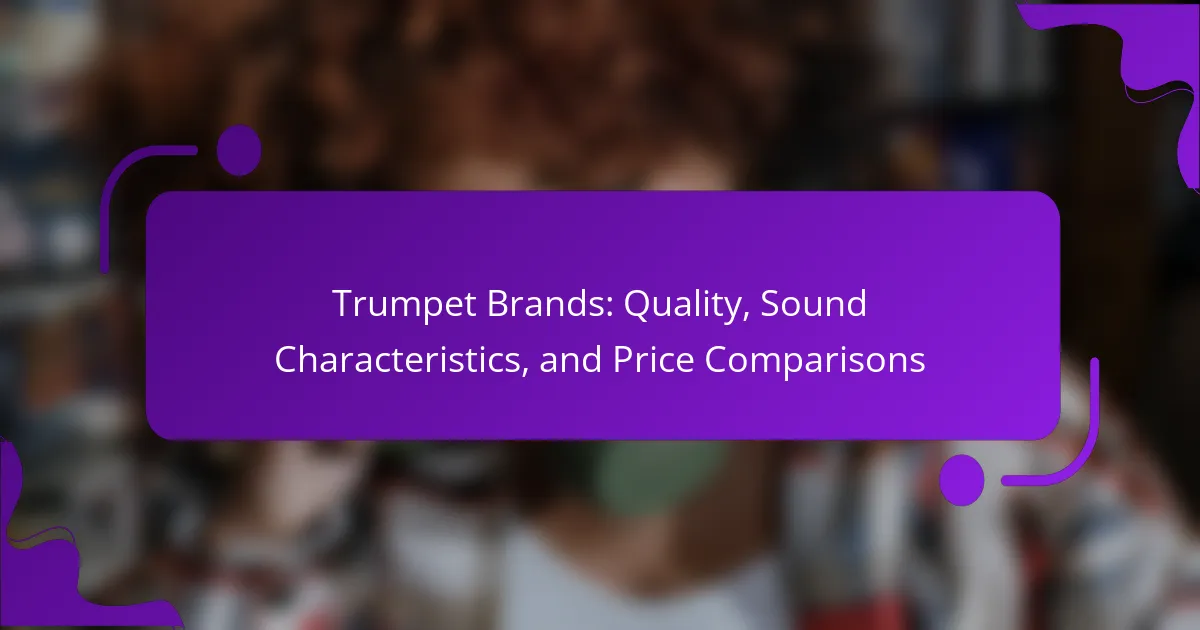Trumpet brands encompass a variety of instruments characterized by high-quality craftsmanship, diverse sound attributes, and a range of price points. Key factors influencing quality include the materials used, such as brass or silver plating, and design elements like bell size and bore shape. The market features models tailored for different skill levels—beginner, intermediate, and professional—ensuring accessibility for all musicians. Notable brands, including Yamaha, Bach, and Conn, are recognized for their reliability and performance, with each offering unique features that cater to individual preferences and playing styles. Price comparisons indicate that while student models are more affordable, professional trumpets can be significantly more expensive, reflecting their advanced capabilities and construction quality.

What are the key features of trumpet brands?
Trumpet brands typically feature high-quality craftsmanship, diverse sound characteristics, and varying price points. Quality is often determined by materials used, such as brass or silver plating. Sound characteristics can differ based on design, bell size, and bore shape. Brands may offer student, intermediate, and professional models to cater to different skill levels. Price comparisons reveal that student models are generally more affordable, while professional trumpets can be significantly pricier. Notable brands like Yamaha, Bach, and Conn have established reputations for reliability and performance. Each brand’s unique attributes contribute to a musician’s choice based on personal preference and playing style.
How do different trumpet brands compare in terms of quality?
Different trumpet brands vary significantly in quality. Brands like Yamaha and Bach are often praised for their craftsmanship and durability. Yamaha trumpets are known for their consistent intonation and smooth playability. Bach trumpets are renowned for their rich tone and are favored by many professional musicians. In contrast, brands like Bundy and King may offer lower quality materials and construction. These brands are often targeted towards beginners. Overall, professional-grade trumpets typically exhibit superior build quality and sound projection compared to student models. The choice of brand can greatly influence a player’s experience and performance.
What materials are commonly used in high-quality trumpets?
High-quality trumpets are commonly made from brass, silver, and gold. Brass is the primary material due to its excellent acoustic properties. It provides a bright and resonant sound. Silver-plated trumpets enhance the tonal quality and add aesthetic appeal. Gold trumpets are less common but offer a warmer sound and unique characteristics. Some high-end models may also incorporate nickel or other metals for added durability. The choice of materials significantly influences the instrument’s sound and playability.
How does craftsmanship affect the overall quality of a trumpet?
Craftsmanship significantly affects the overall quality of a trumpet. High-quality craftsmanship ensures precise construction and attention to detail. This leads to better sound production and tuning accuracy. For example, well-crafted trumpets often use superior materials. These materials enhance resonance and durability. Additionally, skilled artisans can create seamless joints and optimal valve alignment. This results in smoother airflow and improved playability. A study by the International Trumpet Guild highlights that craftsmanship directly correlates with player satisfaction and performance. Therefore, craftsmanship is crucial in determining a trumpet’s quality and overall performance.
What sound characteristics are associated with various trumpet brands?
Different trumpet brands exhibit unique sound characteristics. For example, Bach trumpets are known for their rich, warm tone. Yamaha trumpets typically offer a bright and focused sound. Getzen trumpets are recognized for their clear and projecting sound quality. Conn trumpets often provide a darker, more mellow tone. Schilke trumpets are praised for their excellent intonation and clarity. Each brand’s design and materials influence these sound traits. The bell shape, bore size, and leadpipe design contribute to the overall sound profile. These characteristics are essential for musicians when selecting a trumpet that suits their playing style.
How do different brands influence the tone and projection of a trumpet?
Different brands influence the tone and projection of a trumpet through variations in materials, design, and craftsmanship. Brands like Bach and Yamaha are known for their specific metal compositions, which affect resonance. The bell shape and taper used by a brand can alter sound projection and tonal color. For instance, a wider bell may produce a warmer tone with greater projection. Additionally, the quality of valves and leadpipes impacts airflow, influencing response and sound clarity. Each brand’s unique approach to manufacturing contributes to distinct sound characteristics that players may prefer based on their style and genre.
What role does design play in the sound quality of trumpets?
Design significantly influences the sound quality of trumpets. The shape and material of the trumpet affect its resonance and projection. A well-designed bell produces a fuller, richer tone. The bore size impacts airflow and resistance, altering sound characteristics. Valves and their layout contribute to smoothness and intonation. Design elements like bracing and weight distribution affect playability and sound clarity. Historical examples show that professional models often utilize advanced design techniques for superior sound. For instance, the Bach Stradivarius is renowned for its meticulous design and exceptional sound quality.
What price ranges can be expected for different trumpet brands?
Trumpet brands vary significantly in price, typically ranging from $300 to over $5,000. Entry-level trumpets from brands like Yamaha and Bach can start around $300 to $1,000. Intermediate models usually fall between $1,000 and $3,000. Professional trumpets, particularly from high-end brands like Schilke or Monette, often exceed $3,000 and can reach up to $5,000 or more. These price ranges reflect differences in craftsmanship, materials, and brand reputation. Quality instruments tend to command higher prices due to their enhanced sound and playability.
How do brand reputations affect pricing in the trumpet market?
Brand reputations significantly influence pricing in the trumpet market. High-reputation brands command higher prices due to perceived quality and reliability. Consumers associate well-known brands with superior craftsmanship and sound, leading to a willingness to pay more. For instance, brands like Bach and Yamaha are often priced higher than lesser-known brands. This pricing reflects their established reputation for durability and performance. Research shows that brand reputation can increase consumer trust, which directly correlates with higher sales prices. In summary, a strong brand reputation enhances perceived value, allowing brands to set premium prices in the trumpet market.
What factors contribute to the cost of a trumpet?
The cost of a trumpet is influenced by several factors. These include the materials used in construction, such as brass or silver. The quality of craftsmanship also significantly affects the price. Brand reputation plays a role, as well-known manufacturers often charge more. The type of trumpet, whether Bb, C, or others, can impact cost as well. Additional features, like valves and finishes, contribute to the overall price. Finally, the instrument’s age and condition can affect its market value. For example, vintage trumpets may command higher prices due to rarity.

How do trumpet brands cater to different skill levels?
Trumpet brands cater to different skill levels by offering a range of instruments designed for beginners, intermediate, and advanced players. Beginner trumpets typically feature lighter construction and simpler designs, making them easier to handle. Brands often include features like durable materials to withstand the rigors of learning. Intermediate models may incorporate better valves and improved sound quality, catering to developing players. Advanced trumpets offer professional-grade components, such as custom bell shapes and high-quality finishes. These instruments are crafted for nuanced sound and performance. Brands like Yamaha and Bach provide models across these skill levels, ensuring players can find an appropriate fit for their needs. This tiered approach allows players to progress without needing to switch brands.
What are the best trumpet brands for beginners?
The best trumpet brands for beginners include Yamaha, Bach, and Conn. Yamaha is known for its reliable build quality and ease of play. Bach trumpets offer a warm sound and are favored by many educators. Conn provides affordable options with good sound quality. These brands are widely recommended by music teachers and professionals. They cater specifically to the needs of novice players.
Which features should beginners look for in a trumpet?
Beginners should look for a lightweight trumpet for ease of handling. A smaller bore size, typically .460 inches, aids in producing a focused sound. A brass construction offers durability and a warm tone. Valves should be smooth and responsive, enhancing playability. Adjustable slides allow for better tuning and comfort. A clear lacquer finish protects the instrument and maintains its appearance. Beginner-friendly models often have a reasonable price, making them accessible. Finally, a case for protection and maintenance tools is essential for longevity.
How do beginner trumpets differ from professional models?
Beginner trumpets differ from professional models in several key aspects. Beginner trumpets are typically made from less expensive materials like yellow brass. Professional models often use higher-quality materials, such as gold brass or sterling silver.
The construction of beginner trumpets is generally simpler, with fewer features. Professional trumpets include advanced features like adjustable triggers and custom leadpipes.
Beginner trumpets have a more limited range of sound quality. Professional models provide greater tonal richness and projection.
Additionally, beginner trumpets are designed for ease of playability. Professional models require more skill but offer enhanced response and flexibility.
Price is another significant difference; beginner trumpets are more affordable, usually ranging from $200 to $600. Professional trumpets can cost anywhere from $1,000 to over $5,000.
What brands are preferred by professional trumpet players?
Professional trumpet players prefer brands such as Bach, Yamaha, and Getzen. Bach trumpets are known for their rich sound and extensive customization options. Yamaha is favored for its reliability and innovative designs. Getzen offers high-quality craftsmanship and excellent intonation. These brands are often used by professionals in orchestras and solo performances. Their popularity is supported by endorsements from renowned musicians. Many professional players choose these brands for their consistent performance and sound quality.
What advanced features are found in professional trumpets?
Professional trumpets often include advanced features such as adjustable finger rings and third valve triggers. These features enhance player comfort and control. Many professional models have a one-piece bell construction for improved sound projection. Additionally, they may offer interchangeable leadpipes for customized tuning. Some professional trumpets incorporate a gold brass or sterling silver bell for warmer tone quality. High-quality pistons and valves ensure smooth action and durability. These attributes collectively contribute to the overall performance and versatility of the instrument.
How do professional trumpets enhance performance?
Professional trumpets enhance performance through superior craftsmanship and design. They typically feature high-quality materials that improve sound projection. The precision of their valves allows for smoother playing and faster response. Additionally, professional trumpets often have advanced bell designs that contribute to richer tonal quality. These instruments are engineered to produce a more focused sound, which is essential in orchestral and solo performances. Their ergonomic design ensures comfort during extended play. Research indicates that professional trumpets can significantly elevate a musician’s overall sound quality and technical capabilities.

What are the top trumpet brands in the market today?
The top trumpet brands in the market today include Bach, Yamaha, and Conn-Selmer. Bach trumpets are renowned for their craftsmanship and rich sound quality. Yamaha is known for its innovative designs and reliability. Conn-Selmer offers a variety of models that cater to different skill levels. Other notable brands include Getzen and King, which are also respected in the industry. These brands are favored by both professionals and students alike for their performance and durability.
What makes Yamaha a leading trumpet brand?
Yamaha is a leading trumpet brand due to its commitment to quality craftsmanship. The company utilizes advanced manufacturing techniques to ensure precision in every instrument. Yamaha trumpets are known for their excellent intonation and responsive playability. The brand offers a wide range of models suitable for beginners to professionals. Yamaha’s extensive research and development contribute to innovative designs that enhance sound quality. Many professional musicians prefer Yamaha for its reliable performance in various musical settings. The brand’s reputation is supported by numerous endorsements from renowned trumpet players. Yamaha also provides exceptional customer support and warranty services, further solidifying its position in the market.
What unique attributes does Yamaha offer in its trumpets?
Yamaha trumpets feature unique attributes such as precision engineering, innovative design, and a wide range of models. Their precision engineering ensures consistent performance and quality control. Yamaha incorporates advanced materials, like yellow brass and silver plating, which enhance sound quality. The innovative design includes features like adjustable finger rings and a balanced weight distribution for ease of play. Yamaha also offers customizable options, allowing players to tailor their instruments to personal preferences. Additionally, Yamaha trumpets are known for their excellent intonation and projection, making them suitable for various musical styles. These attributes collectively contribute to Yamaha’s reputation for high-quality brass instruments.
How does Yamaha’s pricing compare to other brands?
Yamaha’s pricing is generally competitive compared to other trumpet brands. Yamaha offers a range of models that cater to different budgets. Entry-level Yamaha trumpets typically cost between $400 and $800. In contrast, other brands like Bach or Conn may start at similar prices but can quickly escalate to higher price points. Intermediate and professional Yamaha trumpets often range from $1,000 to $3,000. This pricing structure aligns closely with brands like Getzen and Schilke. Yamaha’s reputation for quality and durability justifies its pricing. Many musicians consider Yamaha a reliable choice for both beginners and professionals.
What distinguishes Bach trumpets from others?
Bach trumpets are distinguished by their superior craftsmanship and unique sound quality. They are known for their precise intonation and rich tonal characteristics. The use of high-quality materials contributes to their durability and resonance. Bach trumpets often feature a distinctive bell design that enhances projection. Their valves are engineered for smooth action and reliability. Many professional musicians prefer Bach for its consistent performance across various musical genres. The brand has a long-standing reputation, established since the early 20th century, which adds to its credibility. These factors collectively set Bach trumpets apart from other brands in the market.
What are the signature sound characteristics of Bach trumpets?
Bach trumpets are known for their rich, warm tone. This characteristic is a result of their hand-crafted design and quality materials. The bell shape contributes to a resonant sound that is both powerful and clear. Bach trumpets typically produce a focused sound with excellent projection. Their intonation is precise, making them suitable for both solo and ensemble performances. The valves are smooth, allowing for quick and fluid playing. Many professional musicians prefer Bach trumpets for their versatility across various musical styles. The combination of these attributes makes Bach trumpets highly regarded in the brass community.
How does the craftsmanship of Bach trumpets affect their price?
The craftsmanship of Bach trumpets significantly impacts their price. High-quality craftsmanship ensures superior materials and precise manufacturing. Bach trumpets are often hand-crafted, which enhances their durability and sound quality. This meticulous attention to detail results in a higher production cost. The use of skilled artisans in the manufacturing process adds to the overall expense. Additionally, the reputation of Bach as a premium brand influences pricing. Instruments with better craftsmanship typically command higher prices in the market. Therefore, the craftsmanship directly correlates with the value and cost of Bach trumpets.
What should consumers consider when choosing a trumpet brand?
Consumers should consider the quality, sound characteristics, and price when choosing a trumpet brand. Quality refers to the craftsmanship and materials used in the trumpet’s construction. Brands known for high-quality instruments often have a reputation built over years. Sound characteristics include the trumpet’s tonal quality and projection, which can vary significantly between brands. Price is also a critical factor, as it can indicate the level of quality and craftsmanship. For example, professional trumpets typically range from $1,500 to $5,000, reflecting their superior materials and design. Consumers should also read reviews and seek recommendations from experienced players to ensure they choose a brand that meets their specific needs.
How can players assess the quality and sound of a trumpet before purchase?
Players can assess the quality and sound of a trumpet before purchase by testing its playability and tone. They should play various notes and scales to evaluate the instrument’s response. Listening for clarity and resonance in the sound is essential. Players can also check for intonation by playing against a tuner. Inspecting the build quality, including materials and craftsmanship, is crucial. A well-constructed trumpet typically offers better sound quality. Additionally, seeking feedback from experienced players can provide valuable insights. Trying different brands and models helps identify personal preferences in sound characteristics.
What tips can help in selecting the right trumpet brand for individual needs?
Consider your skill level when selecting a trumpet brand. Beginners may benefit from brands like Yamaha or Bach, known for their quality and ease of play. Assess your budget, as prices can range significantly. Brands like Conn offer affordable options without sacrificing quality. Evaluate sound characteristics; some brands produce brighter sounds, while others offer warmer tones. Try different models to find what feels comfortable in your hands. Consult with instructors or experienced players for recommendations based on your playing style. Research brand reputation and customer reviews to gauge reliability and satisfaction.
The main entity of this article is trumpet brands, which encompass various manufacturers known for their quality, sound characteristics, and pricing. The article provides a comprehensive overview of key features associated with trumpet brands, including craftsmanship, materials, and sound profiles that cater to different skill levels from beginners to professionals. It also compares the quality and pricing of notable brands such as Yamaha, Bach, and Conn, highlighting how brand reputation influences consumer choices and the overall cost of trumpets. Additionally, the article discusses essential factors to consider when selecting a trumpet brand, including sound characteristics, build quality, and individual player needs.
